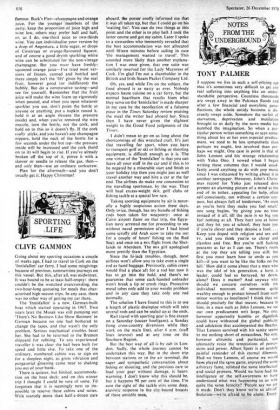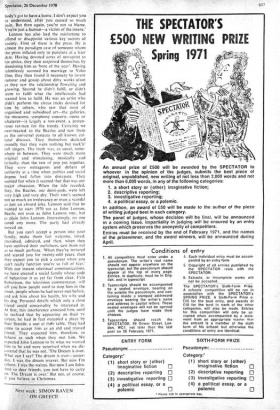TONY PALMER
I suppose we live in such a self-pitying age - that it's sometimes very difficult to get any real suffering into anything like an under- standable perspective. Countlesi thousands are swept away in the Pakistan floods and after a few financial and moralistic genu- flections, the whole untidy business is dis- creetly swept aside. Somehow the surfeit of starvation, deprivation and mutilation brought to us daily by the news media has numbed the imagination. So when a par- ticular person writes something or says some- thing about his or her own especial predica- ment, we tend to be less sympathetic than perhaps we ought, less involved than per- haps we might. One case in point is that of John Lennon and his strange relationship with Yoko Ono. I vowed when I began writing these columns that I would stead- fastly avoid anything to do with pop music since I was exhausted by writing about it in another newspaper. However, John's Christ- mas record for Yoko just released does present an alarming picture of a mind at the end of its tether, appealing for help, often self-consciously, not without a certain coy- ness, but always full of tenderness. 'As soon as you're born they make you feel small,' one song begins, 'by giving you no time instead of it all, till the pain is so big you feel nothing at all. They hurt you at home and they hit you at school; they hate you if you're clever and they despise a fool, ... Keep you doped with religion and sex and Tv, and you think you're so clever and classless and free. But you're still fucking peasants as far as I can see. There's room at the top they are telling you still; but first you must learn how to smile as you kill—if you want to be like the folks on the hill.' How did it come about that a man who was the idol of his generation, a hero, a leader, could feel so betrayed, let down, alone? Does it matter? And anyway why should we concern ourselves with the individual neuroses of someone quite wealthy enough to protect himself from such minor worries as loneliness? I think that we should precisely for that reason; because in him, in a man such as John Lennon, we see our own predicament writ large. No one, however apparently humble or dignified, could have withstood the global publicity and adulation that accompanied the Beatles. That Lennon survived with his sanity seems to me nothing short of miraculous. No one, however altruistic and puritanical, can ultimately resist the temptations of posses- sions and power. Albert Speer is an acutely painful reminder of this eternal dilemma. Had we been Lennon. of course we would have played the same game, enjoyed the same . arbitrary fame, relished the same intellectual and social prowess. Would we have had the intelligence or the self-awareness to have understood what was happening to us with quite the same ferocity? 'People say we got 1 it made. Don't they know we're so afraid? Isolation—we're afraid to be alone. Every. body's got to have a home. I don't expect you to understand, after you caused so much
pain. But then again, you're not to blame.
You're just a human—a victim of the insane.' Lennon has also had the misfortune to offend or disappoint various key sectors of society. First of these is the press. He is almost the paradigm case of someone whom the press inflated only to puncture at a later
date. Having devoted acres of newsprint to his. antics, they then surprised themselves by dismissing, him as 'bore of the year'. Having relentlessly scorned his marriage to Yoko Ono, -they then found it necessary to invent
rumour and gossip about dirty works afoot
as they saw the relationship flowering and growing. Second he didn't fulfil, or didn't seem to fulfil what the intellectuals had
wanted him to fulfil. He was an artist who didn't perform the circus tricks devised for him by others, who saw that most of organised and subsidised art—the galleries. the museums, symphony concerts, opera or whatever—is largely a non-event, a preten- tious rat-race for the trendy. Certainly we over-reacted to the Beatles and saw them
as the universal panacea to all known cul-
tural diseases. They themselves declared roundly that they were nothing but rock'n' roll singers. The truth was, as usual, some-
where in between. They were much more original and stimulating, musically and lyrically, than the -rest of pop put together.
They were outrageous and defiant of authority at a time when politics and social
dogma had fallen into disrepute. They seemed fun when it seemed that that was our major obsession. When the tide receded, they, the Beatles, our demi-gods, were left very high and very dry. Their MBE's seemed not so much an irrelevancy or even a scandal as just an absurd joke. Lennon said that he
wanted to start 1970 not as John Lennon, Beetle, not even as John Lennon MBE, but as plain John Lennon. Interestingly, no one cared any more. The party had already moved on.
But you can't accept a person into your family, make them feel welcome, loved.
cherished, admired, and then, when they
have outlived their usefulness, cast them out as so much garbage. 'When they've tortured
and scared you for twenty-odd years, then they expect you to pick a career when you can't really function you're so full of fear.'
With our instant televisual communications. we have created a social family whose code of behaviOur is as yet far from clear. Fyfe Robertson, the television commentator, will tell you how people used to stop him in the street, people whom he had never met before,
and ask him about his health. his wife and his dog. Personal details which only a close friend could conceivably be interested in. At first, this interference annoyed him, until he realised that by appearing on their Tv screen, he had in fact octupied a place by their fireside, a seat at their table. They had come to accept him as an old and trusted friend. They expected him, therefore, to behave as such when they met him. We expected John Lennon to be what we wanted him to he and were surprised when we dis- coVered that he was not. 'The Dream is over. What can 1 say? The dream is over—yester- day. I was the dream weaver. But now I'm reborn. I was the walrus. But now I am John. And so dear friends, you just have to carry on. The Dream is over.' But not, of course, if you believe in Christmas.



















































 Previous page
Previous page